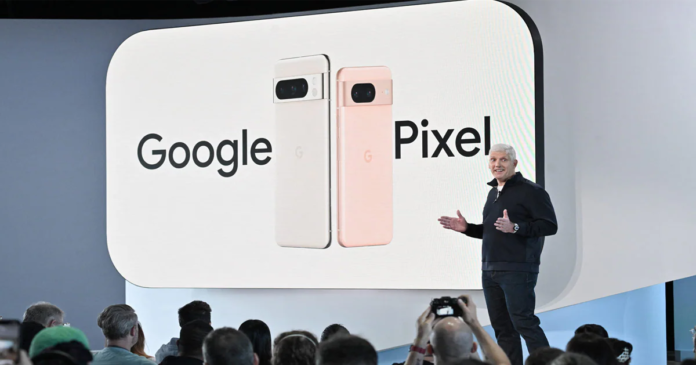Google, a subsidiary of Alphabet, unveiled the Pixel 8 smartphones and a new wristwatch on Wednesday, further integrating artificial intelligence (AI) technology into the company’s most important consumer products.
Google launches Pixel 8: The improvements to the Pixel phones, which are well-liked by those who enjoy photography and those who prefer the stock Android interface, may increase their allure for consumers making holiday season purchases.
The Tensor G3 mobile engine from Google, which integrates a number of machine learning and generative AI models natively on the device, has strengthened the Pixel lineup.
At a Made by Google presentation in New York on Wednesday, executives explained how the AI functions may assist users with photography, summarising websites, and eliminating spam calls.
Temperature sensing is add to the more expensive Pixel 8 Pro. In order to allow the Thermometer app to take body temperature readings, Google has submitted an application to the Food and Drug Administration.
The price of the Pixel 8 and Pixel 8 Pro is $100 more expensive than the phones from the previous generation. They will be offered starting on October 12.
IDC analyst Ryan Reith said, “Google clearly focused on driving the mobile AI message in today’s event, and having AI on the device/client will be a big topic for the industry going forward.”
“Google could drive higher market share with this lineup, particularly in the US, if supported by strong marketing.”
Apple introduced a new series of iPhones last month featuring a faster chip, a new titanium exterior, and improved video game playability.
The biggest surprise about the iPhone 15 was that pricing did not increase, despite a decline in smartphone sales worldwide.
“Google Pixel Ranks 12th in Global Shipments, Focuses on AI-Powered Virtual Assistant and New Smartwatch”
IDC reports that Google Pixel shipments rank 12th worldwide with a 0.9% share.
According to IDC, the United States is Pixel’s largest market, accounting for about 39% of its global shipments, followed by Japan at 29% and the United Kingdom at 9%.
Additionally, Google revealed intentions to give its virtual assistant access to generative artificial intelligence, which would enable it to assist users with tasks like vacation planning or email catch-up before posing follow-up queries.
The firm unveiled Google Watch 2, an improvement to the first wearable, which went on sale in October of last year for $349. It receives a digital crown and sophisticated health monitoring capabilities driven by AI.

